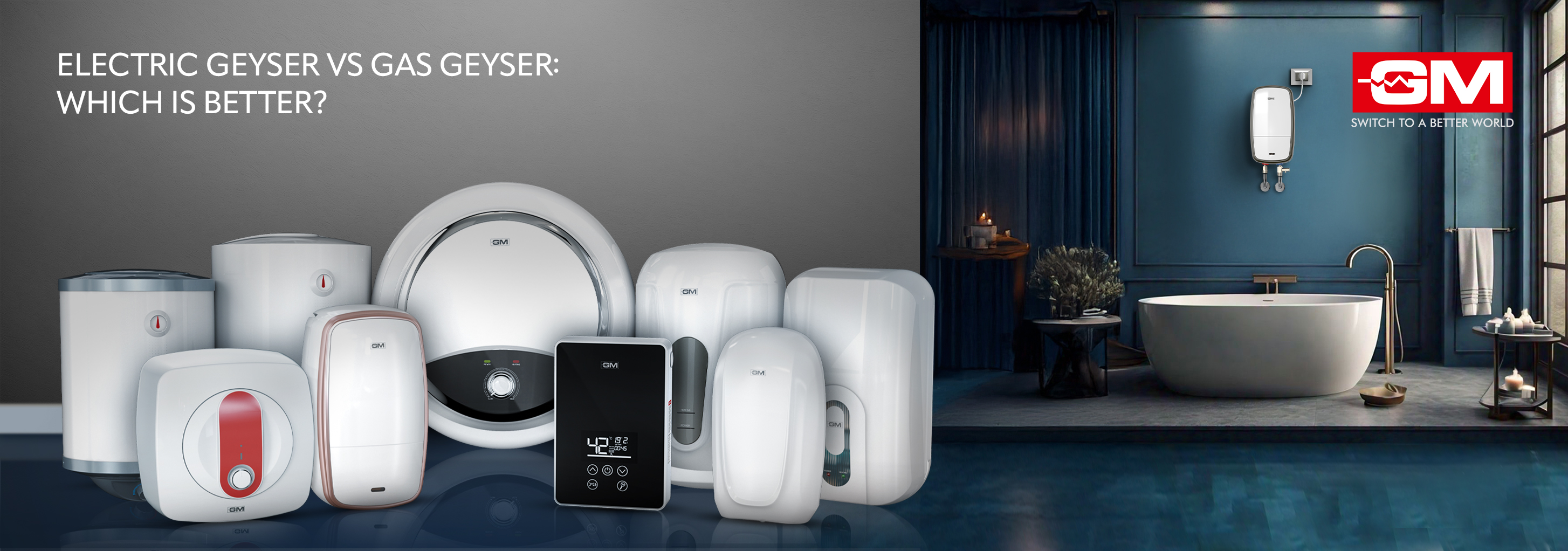Blog
Electric Geyser vs Gas Geyser: Which Is Better?
Updated on Dec 2024

Choosing the right water heater is a crucial decision that can significantly impact your daily comfort and energy bills. The age-old debate between electric geysers vs gas geysers often arises, leaving homeowners perplexed. Both types offer distinct advantages and disadvantages, making it essential to weigh your specific needs before making a choice. In this blog post, we will delve into the difference between gas geysers and electric geysers and explore the factors that can help you determine which geyser is best gas or electric.
What Is an Electric Geyser?
An electric geyser operates using electricity to heat water. It uses a heating element inside a storage tank or instant water heating system to quickly warm water. But is an electric geyser safe? Yes, absolutely. Electric geysers nowadays come equipped with automated features for an advanced safety experience. Modern electric geysers are highly efficient and cater to various household needs.
Advantages of Electric Geysers
- Ease of Use: With a simple flip of a switch, enjoy hot water in just minutes!
- Safety: Since there is no direct fuel involved, electric geysers are safer than gas geysers.
- Fast Heating: Electric geysers heat water faster than gas geysers, making them ideal for quick use.
- Durability: They are designed to last longer, often up to 10 years, due to modern technology.
- Compact: Wall-mounted electric geysers require minimal space, making them suitable for urban homes.
- Environment-Friendly: With negligible carbon emissions, electric geysers are considered eco-friendly.
Disadvantages of Electric Geysers
● Dependency on Electricity: They require a constant power source, making them unsuitable for areas with frequent power cuts.
● Higher Running Costs: Compared to gas geysers, electric geysers are more expensive to operate due to electricity costs.
What Is a Gas Geyser?
A gas geyser uses liquefied petroleum gas (LPG) or piped natural gas (PNG) as a fuel source to heat water. These geysers are popular in areas with limited electricity access or frequent power outages.
Advantages of Gas Geysers
- Cost-Effective: Gas geysers are cheaper to operate as gas is often more economical than electricity.
- Continuous Heating: They provide an uninterrupted hot water supply without dependency on electricity.
- High Heating Capacity: Gas geysers are ideal for large families due to their ability to heat large volumes of water.
- Quick Repairs: Maintenance and repair are generally easy and affordable.
Disadvantages of Gas Geysers
● Safety Concerns: Gas leaks or improper ventilation can lead to accidents and carbon monoxide poisoning.
● Shorter Lifespan: Gas burners are more prone to wear and tear, reducing the durability of the appliance.
● Environmental Impact: Gas geysers emit carbon dioxide, making them less eco-friendly than electric geysers.
● Space Requirements: They need additional space for gas cylinders and proper ventilation.
Key Differences Between Electric and Gas Geysers
| Criteria | Electric Geyser | Gas Geyser |
| Cost | Higher upfront and operational costs | Lower operational cost, higher installation cost |
| Heating Speed | Heats water quickly | Slower heating process |
| Safety | Safer due to no direct fuel | Potential risks due to gas leaks |
| Environmental Impact | Minimal carbon footprint | Higher carbon emissions |
| Space Requirements | Requires minimal space | Needs space for gas cylinders and ventilation |
| Durability | Longer lifespan (up to 10 years) | Shorter lifespan |
| Power Dependency | Dependent on electricity | Operates independently of electricity |
Also Read: Different Types of Water Heaters for Your Home.
Which Geyser Is Best: Gas or Electric?
Choosing between a gas or electric geyser depends on your specific needs, preferences, and living conditions. Here's a breakdown to help you decide:
Choose an Electric Geyser If:
● You live in an urban area with a stable power supply.
● Safety is a top priority for your household.
● You prefer an eco-friendly and compact water heater.
● You want a durable appliance with a long lifespan.
Choose a Gas Geyser If:
● You live in an area with frequent power outages.
● You have a large family and need continuous hot water.
● Cost efficiency in terms of fuel is a significant concern.
● You have the necessary space and ventilation for installation.
Why GM Modular’s Electric Geysers Stand Out
GM Modular offers the best electric geysers designed to meet modern heating needs. With innovative features and advanced safety measures, GM Modular geysers are a perfect blend of functionality and style.
Features of GM Modular Electric Geysers
- High Efficiency: With 99.5% heating efficiency, these geysers provide rapid heating for your convenience.
- Safety First: Equipped with thermal cutout, fire retardant cables, and rust-proof bodies for maximum protection.
- Energy Saving Mode: Reduces electricity consumption, making them cost-effective in the long run.
- Elegant Design: Their sleek, circular plastic body enhances the aesthetics of any bathroom.
- Durability: Comes with a 7-year warranty on the inner container, ensuring long-term reliability.
- Affordable Pricing: GM Modular electric geysers prices offer premium features at a competitive range, making them an excellent choice for families seeking value and performance.
When it comes to electric geysers vs gas geysers, both options have their merits. Electric geysers are a promise of safety, efficiency, durability and sustainability, making them a preferred choice for urban households. On the other hand, gas geysers are cost-effective and ideal for regions with unreliable electricity. With GM Modular’s advanced electric geysers, you get a blend of modern technology, safety, and style, ensuring a superior water heating experience for your home. Choose wisely and enjoy uninterrupted comfort!
Related Blogs

Why Upgrading MCBs and RCCBs Is Essential in 2026
Picture this: you're hosting a family dinner, the air conditioner is running, the induction cooktop is on full blast, and someone plugs in the mixer grinder. Suddenly, everything goes dark. If this scenario feels familiar, your home's electrical prot
Read More
Why LED Lighting Will Be the Standard for Homes in 2026
Modern residential illumination in 2026 is defined by the strategic integration of LED strip lights. By providing a soft, indirect glow that avoids the harshness of traditional tubes, these solutions allow Indian homeowners to achieve a sophisticated
Read More
Is 2026 the Right Year to Upgrade to Smart Switches?
Picture this: you are already running late for work, and halfway to the office, a nagging thought strikes—did you turn off the bedroom AC? Now imagine resolving that worry with a single tap on your phone. This is not a distant dream anymore. Sm
Read More
Home Automation Trends to Watch in 2026
Imagine walking into your home after a long day. The lights adjust to your preferred evening setting, the fan speeds up to counter the summer heat, and your favourite playlist begins softly in the background. No buttons pressed, no commands spoken. T
Read More